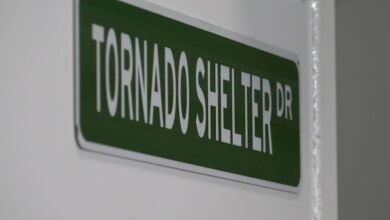Opinion | ‘They’re Coming After All of Us. So You Might as Well Tell the Truth.’

In this episode of “The Opinions,” the New York Times Opinion columnist Lydia Polgreen speaks to the author and activist Sarah Schulman on resistance and solidarity during politically charged times.
Below is a transcript of an episode of “The Opinions.” We recommend listening to it in its original form for the full effect. You can do so using the player above or on the NYT Audio app, Apple, Spotify, Amazon Music, YouTube, iHeartRadio or wherever you get your podcasts.
The transcript has been lightly edited for length and clarity.
Lydia Polgreen: I’m Lydia Polgreen, and I’m a columnist for The New York Times. In my many years as a journalist, I’ve never seen anything quite like the swift and relentless attacks on our most fundamental rights and freedoms that we are witnessing under the second Trump administration.
News clip: Immigration and Customs Enforcement admitted to an administrative error that resulted in the deportation of an undocumented man to El Salvador.
News clip: This letter from the Trump administration and the Department of Education, it orders all colleges in K through 12 schools to end diversity, equity and inclusion programs and initiatives, or they run the risk of losing federal funding.
The government is actively clamping down on any dissent, particularly among students, teachers, and activists.
News clip: The government is trying to deport Khalil over his role in pro-Palestinian protests at the school last year. A lot of fear and uncertainty rippling through college campuses across the country tonight, after the Trump administration revokes hundreds of international student visas.
To better understand the moment we’re in and what we might do about it, I wanted to speak to my friend Sarah Schulman.
Sarah has played a defining role in leftist thought from her work on the AIDS crisis to conversations around Israel and Palestine. She’s just written a book called “The Fantasy and Necessity of Solidarity,” which draws upon her previous works and speaks to this moment in history.
Sarah, thank you for joining me.
Sarah Schulman: Thank you so much.
Polgreen: So this book had its genesis in the ongoing crisis that has been unfolding in Israel and Palestine, but it is also coming out in a world where we have a new Trump administration and things are unfolding much closer to home.
I’d love to just hear you talk about both the original intention of the book and what you mean by solidarity. Why do you think it was important to write this book at this particular moment?
Schulman: Well, the point of the book is to make solidarity more doable. And in order to do that I’m trying to strip away the idea of heroism, perfectionism and pure motive, because I feel that those things are unachievable and they keep people from trying to participate in solidarity.
So the book is an array of very interesting, weird people and interesting movements that haven’t been covered. Their moments of complexity that help us see that solidarity really just builds infrastructure for the future. It doesn’t solve the problems. If we can look at it that way, I think it’s easier to try.
Polgreen: There are a couple of different strands in there I want to pick up on, but just beginning with the title of the book, I understand the necessity part, but I also want to talk about the fantasy, because people have this very romantic idea of what it means to come together.
There were a couple of lines in the book that really struck with me along this theme. One is that you say solidarity is a relationship rooted in inequality. The other is that justice by definition is not a popularity contest, and solidarity does not require love.
I think that these are very challenging ideas for people because particularly in this time, we fantasize about a kind of kumbaya moment where everyone has perfect alignment.
I think there’s an expectation that there is going to be this kind of perfect agreement and that one has to make, as you write, a kind of perfectionist analysis and say, do we agree on absolutely everything in order to move forward together?
Schulman: Well, that doesn’t work. I mean, historically, no movement that has tried to force everyone in it to agree on one analysis and one strategy has succeeded. They have all failed. And the reason is very simple. People are different. And I know that’s really hard to accept, and I had to be in therapy for 20 years to accept that people are different, but they just are and people can only be where they’re at.
Trying to force people to think and believe things that they don’t think and believe will sabotage your movement. So real leadership is about helping people be effective from where they’re at.
Polgreen: For the left, there has never perhaps been a more vital time to wrestle with these ideas of solidarity, of stepping outside of one’s safety and family and tribe.
I think one of the things that’s been toughest for me is seeing how Trump’s popularity is slipping. You see that people are not trusting him on the economy. I think we can see why. People are angry about a variety of other issues; they think that the tariffs are a bad idea.
But the one place where his approval remains in positive territory is on immigration. And to me, I look at that and I just think, my God, this is the realm in which he is exercising the greatest cruelty and stepping the furthest outside of the bounds of, certainly the law, but also of human decency.
And I guess my challenge is my ability to be in solidarity with the people who are angry at Trump for other reasons, but are indifferent to the cause that I care about most.
So I’d love you to give me a little bit of therapy about how to be in solidarity with people who don’t care about Palestine, who don’t care about trans rights, who don’t care about immigrants, but are angry at the Trump administration and are potential allies in making change happen.
Schulman: The challenge of Big tent politics is working with people that you don’t agree with.
I would say radical democracy is about accepting differences with a bottom line. You have to have a bottom line. Then it’s a kind of emotional maturity that you can partner with people when you agree and when you disagree, walk away from them.
One example is the Catholic Church. I disagree with the Catholic Church on almost everything. But in certain neighborhoods, when people are facing eviction, the Catholic Church is there to defend them. And that’s a time that you move in and work with them. Once they bring up abortion, then you walk away.
This gets back to where we started, which is this fantasy of perfection that does us in every time.
Polgreen: I think the other thing that I’ve been thinking about a lot is the role of those who are early to understand danger. You write in the book about how the American supporters of the Spanish Republican movement against the fascists suffered for being what you call prematurely antifascists.
Schulman: That was a government term.
Polgreen: Oh, really? Wow. Say more about this group because I think as we think about the way that events are unfolding now, it really does seem as though, particularly those who are involved in the student movement and the other movements for Palestine, are suffering a similar fate.
Schulman: It’s always difficult to be in the first group of people that understands something. It’s better to be in the fifth, you know, because people are already used to it.
But these were people like the Abraham Lincoln Brigade. Americans who wanted to fight fascism in Spain, the U.S. government would not support them. And of course later the U.S. entered the war against fascism. So by the ’40s, the average American would describe themselves as fighting against fascism. But these people did it before it became the status quo.
So when McCarthyism came in, they were called prematurely antifascist, which is this absurd term, but it’s something we can all recognize, which is people who understand injustice and start acting towards it before it’s acceptable or even discussed in a public way.
And what that shows, I think, is that early insight starts to build the infrastructure of movements. Sometimes it’s just the politics of repetition, but by the time movements are ready, they already have pre-existing organizations. They already have books. They already have ideas that have been formulated that they can build on.
That’s what we’re seeing now with the Palestine Solidarity Movement. They have organizations like Students for Justice in Palestine — it’s 30 years old — and that has been able to propel people forward.
Polgreen: It does feel like this is a profound moment of despair and of disillusionment of fear. I’d love to just hear you reflect a little bit on how you manage the emotional landscape of this moment. You’ve been there watching friends die when you were part of ACT UP during the height of the AIDS crisis.
How do you manage that feeling of hopelessness?
Schulman: Well, it is true that there are a lot of cowards. A moment like this really shines the light on everybody. And sometimes it’s surprising, but there are so many decent people out there and there’s so much resistance going on. But it’s not at the top.
It’s interesting because the student movement has not been stopped even with all this punishment. I mean, these students at Barnard who not only were expelled, but their colleagues had their diplomas revoked, after they graduated — which is insane. All this is doing is alienating people from these institutions. It’s discrediting the institutions.
I’m seeing it at my school, because I’m the faculty adviser to Jewish Voice for Peace at Northwestern University. My students are so sincere in their objection to the Israeli war on Gaza that they are willing to risk discipline by the administration because they have to live with themselves. That’s very inspiring.
I start the book with a quote from Haddi Shafi, who is a Palestinian lesbian leader, and she says: Think about what you can do, not what you can lose.
That is my mantra because as I’ve been going through the world, I’m constantly engaging people who are terrified that they’re going to lose some status, they’re going lose some access — and often they do. But you get something else, which is this internal coherence of integrity.
So in a way, I feel like the greatest hope that we have is to expand our integrity so that we can maintain it. Because it’s the only thing we can control.
Polgreen: Yeah. One of the real pillars of your work and your activism is the idea of direct action. I’d love to hear you talk a little bit, particularly in this moment, about the history and importance of direct action in making change happen.
Schulman: It’s interesting because very effective movements, starting with Dr. King’s movement, which was a direct action movement, and going through ACT UP, the AIDS activist movement, which used very similar tactics.
The way they moved forward was by building campaigns, and this is something people have lost. It’s not just getting huge numbers of people in the street to yell and scream and then they go home. That doesn’t help.
You need to first become the expert on your issue. Then you need to design solutions that are reasonable, winnable, and doable. You go to the powers that be and you bring your proposal. And when they say no, then you use nonviolent, theatrical civil disobedience to communicate through the media to the public what your solution is. Every action you take is to build on this demand and this campaign.
That’s sometimes what’s missing. This idea of a winnable goal and that you use actions to build towards that goal. Without that, you’re often just wasting energy.
Polgreen: So in this moment right now, let’s take for example, the detention of students who hold legal status to be in the United States, but are not in America. What would you imagine would be an agenda for direct action, achievable goals? Because I think people are really hungry for ideas. And again, I’m not saying this is your space. But I think it’d be helpful just to hear your thoughts on how one might approach this.
Schulman: I think right now there’s a three-part approach. One is legal. We have our lawyers who are in the courts. There are some judges who are reasonable. There is a problem of enforcement because the government has dismantled enforcement, but that is one approach.
The second is protest. We’ve seen demonstrations inside Trump Tower. We’ve seen students chaining themselves to fences. We’re seeing constant objection on the part of the people against these kidnappings.
The third is providing information to students about how they can protect themselves and what their rights are, in relation to ICE, the kind of questions they can ask. And then there are some schools that are providing legal protection — as they should.
It’s the simultaneity of action that always makes movements effective. And that’s what we’re seeing. There is no quick fix for this moment. This moment is a cataclysm. But speaking out, being informed, working with others, allowing for multiple approaches, that’s what we can do.
Polgreen: It seems though, that the other thing that is happening is a kind of intimidation. A threat of violence. You had President Trump, you know, speaking on Air Force One about how he’d love to send American citizens to El Salvador if it was possible. I think there is a very strong and palpable fear that seems designed to deter direct action.
Schulman: There is. But you know, in the end — it’s funny because I was talking to my sister recently about our ancestors who were exterminated in the Holocaust. And she asked me: What camps did our aunts and uncles die in? And I said: Well, they never made it to the camp. They were shot in the town square of their town.
And I started thinking about that and I realized, you know, in the end, you don’t protect yourself by what you say or don’t say because you become an anonymous mass from the point of view of fascist. So it’s this kind of narcissistic fear that if you tell the truth, they’re going to spot you and they’re going to come after you. They’re coming after all of us. So you might as well tell the truth.
Polgreen: You are also a prolific novelist and playwright and I know you primarily think of yourself as an artist in this time. I’ve been finding myself really leaning on art as a place to find a sense of connection and community and meaning.
I’m curious what are the works and experiences that you’re leaning on in this time to provide inspiration? To give you a sense of groundedness?
Schulman: There’s two pieces that I think of. One is “Zone of Interest,” a film by Jonathan Glazer. The second is a novel, “Minor Detail,” by the Palestinian writer Adania Shibli.
They both work very similarly to show us that the past and the present exist simultaneously. That is something that we need to take in. That we’ve been here before. These things are rooted in the past.
I just read “Red Scare” by Clay Risen, and what it really reveals is that the Red Scare was a white, Christian male rebellion against the New Deal and women and Black people getting money to write and make paintings and build rural theater companies and all of this kind of thing. It’s very similar to Jim Crow being a resistance to Reconstruction. These are not all discrete events. These are patterns of people, multitudes of different kinds of people rising in this country and then being opposed by this very small minority that has a lot of power.
And this gets back to the immigration issue. Many people in the United States have projected their anxieties and problems onto immigrants without realizing that it’s actually being caused by the 1 percent that are stealing the wealth of the country. When people are not getting their Social Security checks, when they’re watching the tech bros rising and rising. Maybe some connections will happen because of their actual lived experience.
Polgreen: Well, I think that’s a really good place to end it. Sarah, thanks so much for talking with me.
Schulman: Thank you, Lydia.
Thoughts? Email us at theopinions@nytimes.com.
This episode of “The Opinions” was produced by Vishakha Darbha. It was edited by Alison Bruzek and Kaari Pitkin. Mixing by Efim Shapiro. Original music by Pat MuCusker and Isaac Jones. Fact-checking by Mary Marge Locker. Audience strategy by Shannon Busta and Kristina Samulewski. The director of Opinion Audio is Annie-Rose Strasser.
The Times is committed to publishing a diversity of letters to the editor. We’d like to hear what you think about this or any of our articles. Here are some tips. And here’s our email: letters@nytimes.com.
Follow the New York Times Opinion section on Facebook, Instagram, TikTok, Bluesky, WhatsApp and Threads.




